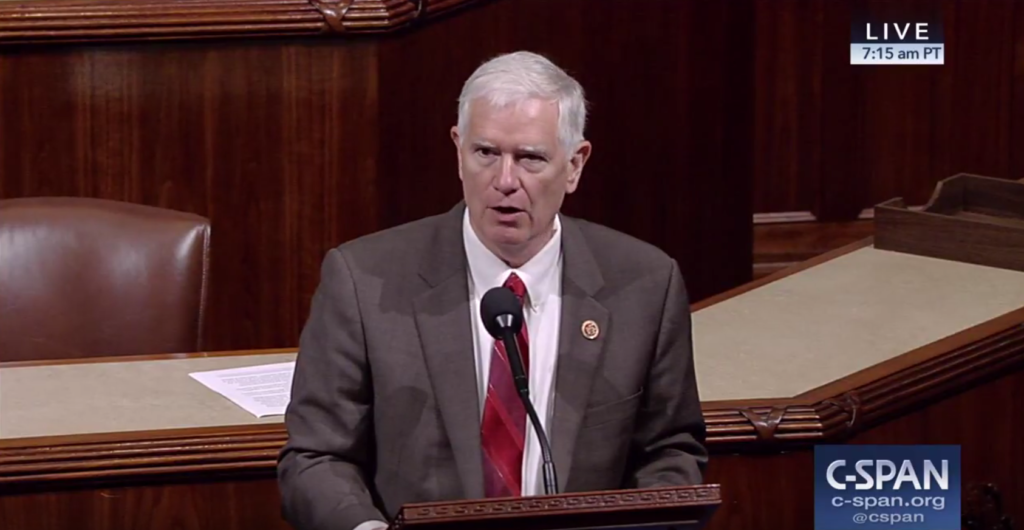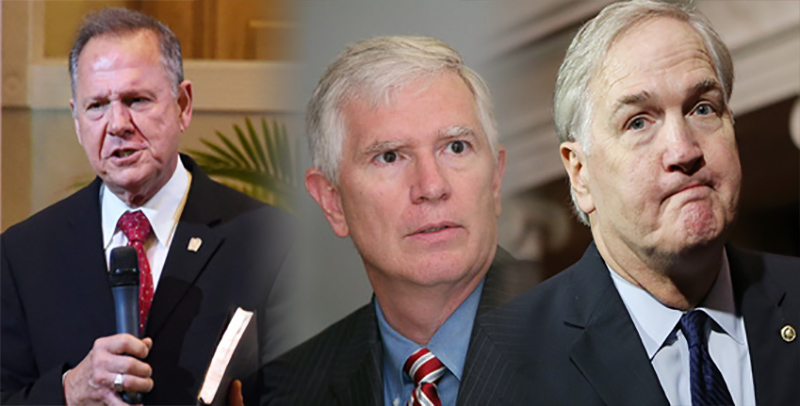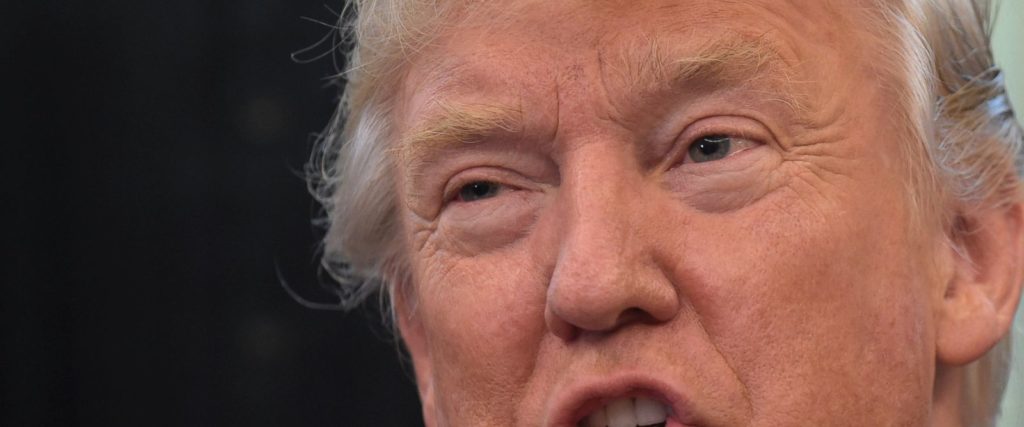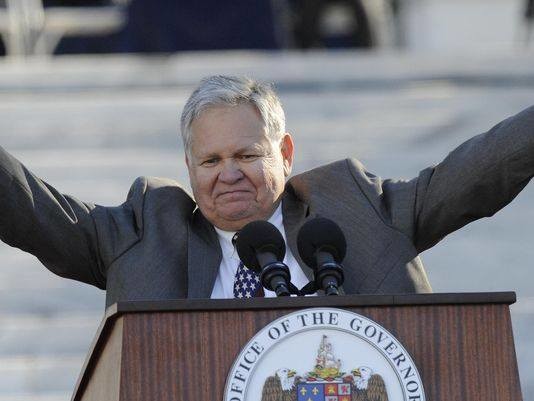Early Donald Trump attacks could hurt Mo Brooks in U.S. Senate race

During the 2016 GOP presidential primary, Congressman Mo Brooks called then-candidate Donald Trump a “serial adulterer,” only offering tepid support for him in the general election. Brooks, now in the middle of a contentious Republican primary for the Alabama U.S. Senate seat once held by Attorney General Jeff Sessions – a key supporter of the president – could struggle because of those attacks on Trump, who won Alabama by nearly 30 points. In the past, Alabama Republicans have turned on GOP lawmakers they see as anti-Trump. Brooks, who is looking to defeat incumbent Sen. Luther Strange to serve the rest of Sessions’ term, could be called to task for his past comments on Trump. The Hill notes that Brooks’ remarks could hurt him in the race against Strange and former Alabama Supreme Court Justice Roy Moore, well-known for his high-profile religious liberty battles. But in an interview with The Hill, Brooks downplayed Trump attacks, saying they were to support for Sen. Ted Cruz’s unsuccessful presidential bid. “When I’m in combat, a political fight, I use all weapons at my disposal, as I’m sure all of the candidates do,” Brooks said. “Once the fight was over with, it was important for our nominee to win the election.” Brooks added: “I’m not going to rehash the arguments I used to try to persuade voters to vote for the candidate of my choice in the primary, Ted Cruz. I will say, right now, Donald Trump is a vastly superior choice to the alternative of Hillary Clinton.” However, that’s a significantly different tone than February 2016, when Brooks told MSNBC a day before the Super Tuesday primaries: “I think what you are going to see 12 to 18 months from now is that a lot of people who have supported Donald Trump, they are going to regret having done so.” “I don’t support people who support adultery, and I don’t trust people who are serial adulterers, as Donald Trump has been and bragged about in writing because I don’t think that is an honorable thing or trait in a person,” he added. Nevertheless, since Trump’s victory, Brooks has become an outspoken supporter. In a speech on the House floor a few weeks after the election, Brooks defended Trump’s unsubstantiated claim that he “won the popular vote if you deduct the millions of people who voted illegally.” “A circus of left-wing media pundits immediately pounced on President-elect Trump’s opinion in an effort to silence serious discussion of the noncitizen voter fraud problem,” Brooks said. This change of heart may not be enough to sway Alabama voters, who already sent a message to Republican U.S. Rep. Martha Roby. Roby had also called for Trump to step aside after the release of the “Access Hollywood” tape where he makes lewd comments about grabbing women. Although Roby eventually won re-election, it was by only nine points – a much narrower margin than expected for her heavily-Republican district, which Trump won by 32 points.
With little fanfare, internal polling gives Roy Moore lead in U.S. Senate race

Sometimes, the most money (or pull) does not guarantee a candidate a polling lead. While incumbent Sen. Luther Strange has financial and institutional support, and U.S. Rep. Mo Brooks gathering congressional backing, it is former Alabama Supreme Court Justice Roy Moore leading in the GOP primary for Strange’s Senate seat. As Daniel Strauss of POLITICO reports, Brooks’ internal polling is showing the firebrand ex-judge – who was suspended from the state Supreme Court over his refusal to honor the federal same-sex marriage ruling – leading the Republican primary field of nearly a dozen candidates with 31 percent. Strange is next at 23 percent, with Brooks at 21 percent; other candidates grouped below the 5 percent threshold. Moore has received less attention than his Washington-centric opponents for the Aug. 15 primary for Attorney General Jeff Sessions‘ old Senate seat. “But he could be an unusually strong obstacle for Strange in an age of unsettled Republican primaries,” Strauss writes. “Moore is hoping his years of high-profile religious fights on the Alabama Supreme Court will fuel his run more than a high-budget campaign would have.”
Donald Trump trashes media, cheers wins at $10 million fundraiser

Republican donors paid $35,000 apiece to hear familiar a message from President Donald Trump: The media, particularly CNN, keep trying to take him down, and yet Republicans just keep on winning elections. He noted with pride that his party had won four special elections this year. The president was whisked a few blocks from the White House to the Trump International Hotel, his name-branded Washington venue, for an evening of hobnobbing behind closed doors Wednesday with major party financiers, including Las Vegas casino mogul Steve Wynn. One attendee stood out: Nevada Sen. Dean Heller, part of a small group of Republicans whose objections just a day earlier had doomed — at least for now — the Senate’s effort to repeal and replace President Barack Obama’s health care law. Trump did not single out Heller, but Wynn, the lead fundraiser for the Republican National Committee, gently jabbed him by urging all Republicans to come together to support the president’s agenda. Breaking with the tradition of his predecessor, Trump barred reporters from the event, despite an announcement earlier in the day that a pool of reporters would be allowed inside. Two people in the room, demanding anonymity to discuss a private event, relayed the messages given by Trump and Wynn. “It’s a political event, and they’ve chosen to keep that separate,” White House deputy press secretary Sarah Huckabee Sanders said when asked why the event was closed to the media. Trump’s first re-election fundraiser comes some 40 months ahead of Election Day. Joined by first lady Melania Trump and top advisers, he held court for about two hours at an event attended by about 300 people that raised more than $10 million. The money is to be spread among Trump’s campaign, the RNC and other GOP entities. Security was tight at the hotel, where guests in long gowns and crisp suits began arriving around 5 p.m. But the event also drew critics. The president’s motorcade was greeted by dozens of protesters, who hoisted signs with slogans like “Health care, not tax cuts” and chanted “Shame! Shame!” Among the event’s guests: Longtime GOP fundraiser-turned television commentator Mica Mosbacher and Florida lobbyist and party financier Brian Ballard. The Trump International Hotel has become a place to see — and be seen — by current and former Trump staffers, lobbyists, journalist and tourists. Several Washington figures of considerable influence popped into the lobby even though they didn’t plan to attend the fundraiser in an adjacent ballroom. Trump’s decision to hold a fundraiser at his own hotel has raised issues about his continued financial interest in the companies he owns. Unlike previous presidents who have divested from their business holdings or interests before taking office, Trump moved his global business empire assets into a trust that he can take control of at any time. That means that when his properties — including his Washington hotel — do well, he stands to make money. Trump technically leases the hotel from the General Services Administration, and profits are supposed to go to an account of the corporate entity that holds the lease, Trump Old Post Office LLC. It remains unclear what might happen to any profits from the hotel after Trump leaves office, or whether they will be transferred to Trump at that time. Under campaign finance rules, neither the hotel nor the Trump Organization that operates it can donate the space for political fundraisers. It must be rented at fair-market value and paid for by the Trump campaign, the RNC or both. Although this was Trump’s first major-donor event, his re-election campaign has been steadily raising money since the day he was inaugurated, mostly through small donations and the sale of Trump-themed merchandise such as the ubiquitous, red “Make America Great Again” ball caps. The campaign raised about $7 million in the first three months of the year, according to Federal Election Commission reports. The RNC also is benefiting from the new president’s active campaigning, having raised about $62 million through the end of last month. The party has raised more online this year than it did in all of 2016 — a testament to Trump’s success in reaching small donors. Trump’s re-election money helps pay for his political rallies. He’s held five so far, and campaign director Michael Glassner says those events help keep him connected to his base of voters. The constant politicking, however, means it is challenging for government employees to avoid inappropriately crossing ethical lines. Some watchdog groups have flagged White House employee tweets that veer into campaign territory. White House spokeswoman Lindsay Walters says the employees work closely with lawyers to avoid pitfalls. Walters also says the White House takes care to make sure that Trump’s political events and travel — including the Wednesday fundraiser — are paid for by the campaign and other political entities. Republished with permission of The Associated Press.
Defense bill passes committee with support of 3 Ala. members, boosts military, supports shipbuilding

The House Armed Services Committee (HASC) voted 60-1 to authorize $696.5 billion in defense spending for 2018 Wednesday night with the support of three Members of the Alabama delegation that sit on the committee. Reps. Bradley Byrne (AL-01), Mike Rogers (AL-03) and Mo Brooks (AL-05) all voted in favor of the Fiscal Year 2018 National Defense Authorization Act (NDAA), which authorizes funding and sets policy for the entire U.S. military. Many reforms were included in this year’s NDAA, including: Increases total military spending by 10% to rebuild from our current readiness crisis; Funds a 2.4% pay raise for our troops; Reforms the military’s acquisition process to make it more efficient; Improves oversight of cyber operations; Creates a new U.S. Space Corps to oversee the evolving space domain; Increases the size of the Army, Navy, Air Force, Army Guard and Reserve, Naval and Air Reserve, and Air Guard; Supports improvements to military facilities with a focus on restoration and modernization; and Authorizes construction of 13 new Navy ships to grow toward a 355 ship fleet. “This year’s National Defense Authorization Act helps rebuild our nation’s military, boosts shipbuilding in an effort to grow our fleet, and ensures our military men and women have the resources necessary to defend our country,” said Byrne of the NDAA. “Once again, we were able to secure authorization for the construction of three more Littoral Combat Ships, which are built right here in Southwest Alabama. These ships continue to excel in the fleet, and that is a testament to the over 4,000 men and women who work at the Mobile shipyard. The legislation included language important for Alabama’s 3rd Congressional District that affects the Civilian Marksmanship Program (CMP) and the Anniston Army Depot (ANAD). Language was also included to study some of the funding mechanisms of the depot in hopes of using the information to make workload planning more dependable and consistent. “The men and women and the Anniston Army Depot work very hard to support our nation’s warfighter and I want to ensure we are doing everything we can in Congress to support them,” said Rogers. “This is the first step in providing our nation’s military personnel with the resources needed to protect America,” remarked Brooks. “The FY18 NDAA authorizes a very substantial $62 billion increase over FY 2017 funding, thereby taking significant steps to reverse military declines and addressing America’s military readiness crisis by increasing the size of the Army, Navy, Air Force, Army Guard and Reserve, Naval and Air Reserve, and Air Guard.” The bill is expected to be considered by the full House in July.
Richard Shelby delivers opening remarks at FY18 NASA budget hearing

On Thursday, the U.S. Senate Appropriations Subcommittee on Commerce, Justice, Science and Related Agencies (CJS) held a hearing to review the FY2018 $19.1 billion budget request for the National Aeronautics and Space Administration (NASA) — a $561 million decrease from current FY2017 funding. Alabama U.S. Senator Richard Shelby, Chairman of the committee, delivered opening remarks in the subcommittee hearing. “This budget request attempts to navigate a challenging fiscal environment, but would disrupt ongoing missions and delay future exploration for years to come,” Shelby said. Shelby continued, “This subcommittee has strived to provide balance funding to the overall NASA portfolio, while also ensuring that ongoing activities are appropriately funded to accomplish NASA’s missions. I look forward to working with you to achieve the appropriate balance for NASA’s missions.” Shelby’s full remarks, as prepared, are below: I am pleased to welcome Acting Administrator Robert Lightfoot to the Commerce, Justice, and Science Appropriations Subcommittee hearing to examine NASA’s Fiscal Year 2018 budget request. Mr. Lightfoot and I worked well together during his tenure as the Director of NASA’s Marshall Space Flight Center in Huntsville, Alabama. Mr. Lightfoot, thank you for serving as NASA’s leader during this time of change and I appreciate you joining us today. The Administration has proposed a fiscal year 2018 budget of $19.1 billion dollars for NASA, which is a reduction of 2.9 percent from the current year level. While this overall cut is less than many other agencies experienced in the President’s budget request, it still reflects a significant reduction of $561 million. This budget request attempts to navigate a challenging fiscal environment, but would disrupt ongoing missions and delay future exploration for years to come. There are proposals to cut science missions and to eliminate the entire education directorate using the rationale that NASA could do without these programs under a reduced budget. Other research programs are left with insufficient financial resources, which will make it impossible for NASA to meet its own management plans and launch schedules. For human exploration, the current administration picks up where the previous administration left off, by projecting a lofty vision for space while providing a budget that keeps that vision from leaving Earth. The Space Launch System and the Orion crew capsule are designed to break our human space program free of its decade’s long tether to low Earth orbit, eventually sending our astronauts to Mars. In addition, SLS will provide NASA with a versatile platform to deliver planetary robotic science and space-based astronomy missions. SLS is the vehicle that will make possible many of NASA’s goals to push the boundaries of exploration. I look forward to an initial launch of SLS and will work to see that a crewed-launch will follow soon thereafter. I believe we must have an accurate budget to reflect these launch decisions and to meet our nation’s exploration goals. If the other pieces necessary for exploration are not ready, we will lose time and waste funds in the near-term that could be used for other important activities down the road. NASA, I believe, must ensure that the rigor with which it reviews its own missions is applied to all of its activities and avoid pressure to send astronauts to space at any cost. There is a growing sentiment that NASA should change the way it does business; that it should be a buyer of commercial transportation services. Were it not for billions in development funds from NASA acting as venture capital, there would be no companies attempting to one day take crews to the space station. Even with this investment, the companies NASA will use for commercial crew services are behind in schedule, the program has increased in cost, and independent observers cite the inability of our partners to meet contracted safety standards. While risk is inherent in anything NASA chooses to undertake, there is no replacement for proper analysis and reasonable precaution when lives and the resources of the nation are at stake. When it comes to agency operations, I am encouraged to see the investments in information technology and cybersecurity in this proposed budget. NASA is very popular with the public and also has a significant amount of data for scientists to use in understanding the universe around us. I believe it is incumbent that NASA be able to share its findings, but the agency must also maintain a secure cyber environment for operations. NASA’s innovative ideas often involve significant risk and also require significant investment. This subcommittee has strived to provide balance funding to the overall NASA portfolio, while also ensuring that ongoing activities are appropriately funded to accomplish NASA’s missions. As with any administration, the proposed budget represents a snapshot in time based on decisions made with the most relevant information available. As the subcommittee moves ahead to produce our annual spending bill, I look forward to working with you to achieve the appropriate balance for NASA’s missions.
GOP ponders whether Donald Trump helps sell health care

It was a platform most politicians can only hope for: A captivated, 6,000-person crowd and more than an hour of live, prime-time television coverage to hype the Republican vision for a new health care system. But when President Donald Trump got around to talking about the Republican plan — about 15 minutes into his speech — he was wildly off message. Instead of preaching party lines about getting the government out of Americans’ health decisions and cutting costs, he declared: “Add some money to it!” The moment captured a major dilemma for Republicans as they look for ways to jumpstart their stalled health care overhaul. A master salesman, Trump has an inimitable ability to command attention, and that could be used to bolster Americans’ support for Republican efforts and ramp up pressure on wavering lawmakers. But some lawmakers and congressional aides privately bemoan his thin grasp of the bill’s principles, and worry that his difficulty staying on message will do more harm than good. “You know, he’s very personable and people like talking to him and he’s very embracing of that, so there will be certain people he’d like to talk to,” said Sen. Bob Corker, R-Tenn. “But I’d let Mitch handle it,” he continued, referring to the lead role Senate Majority Leader Mitch McConnell has played thus far. McConnell delayed a vote on the health legislation this week after it became clear he couldn’t muster enough Republican support to offset the unanimous opposition from Democrats. GOP leaders are now hoping to pass a bill in the Senate and reconcile it with an earlier version approved by the House before lawmakers head home for their August recess. Trump has largely ceded the details to McConnell, deferring to the Kentucky lawmaker’s legislative expertise. He has spent some time talking privately to wavering senators, including Ted Cruz of Texas and Mike Lee of Utah, testing his powers of persuasion. But he’s invested no significant effort in selling the American people on the impact the Republican bill would have on their health care coverage, beyond making sweeping declarations about how wonderful he expects it to be. “We’re looking at a health care that will be a fantastic tribute to your country,” Trump said during a White House event Wednesday. “A health care that will take care of people finally for the right reasons and also at the right cost.” His approach is a contrast to former President Barack Obama, who delivered an address to Congress on health care and held town halls around the country about the Democrats’ legislation in 2009. The Obamacare measure barely cleared Congress and became a rallying cry for Republicans, something Obama blamed in part on a failure by his party to communicate its virtues clearly to the public. At times, even Trump’s largely generic health care commentary has left Republicans fuming. Some lawmakers were particularly irked by Trump’s assertion that the House bill — which he robustly supported and even celebrated with a Rose Garden ceremony — was “mean.” One Republican congressional aide said that comment left some lawmakers worried that the president — who had no real ties to the GOP before running for the White House — could turn on them if a bill passes but the follow-up becomes politically damaging. The official insisted on anonymity in order to describe private discussions. Newt Gingrich, the former GOP House speaker and a close Trump ally, said Republicans have struggled to communicate about the complexities of health care policy because “nobody has served as a translator.” He said Trump is well-positioned to take the lead, but acknowledged that the real estate mogul-turned-politician would need some help from policy experts in formulating a sales pitch. “Trump will be able to repeat it with enormous effectiveness once somebody translates it,” Gingrich said. The White House disputes that Trump isn’t steeped in the details of the Obamacare repeal efforts. Economic adviser Gary Cohn and other officials on the National Economic Council have convened several meetings with him to explain differences between the House and Senate bills. One senior White House official described the president as “fully engaged” in the process. During a private meeting Tuesday with Kentucky Sen. Rand Paul, who is strongly opposed to the current Senate bill, Trump said his priority was to increase the number of insurance choices available to consumers and lower monthly premiums, according to an administration official with direct knowledge of the discussion. The official said the president also specifically highlighted the non-partisan Congressional Budget Office’s projection that average premiums would be 30 percent lower in 2020 if the Senate bill took effect. To some Trump allies, more public engagement on a substantive policy debate like the future of the nation’s health care system would also be a welcome reprieve for a president whose approval ratings have tumbled amid the snowballing investigations into possible collusion between his campaign and Russia. “I think his numbers would go up if he had a couple of addresses,” said Sam Nunberg, a former Trump campaign adviser. “If he communicates directly with the American people, he cuts through the noise.” Republished with permission of The Associated Press.
Jim Zeigler files fundraising committee for governor’s race

State Auditor Jim Zeigler filed a campaign committee Tuesday to begin raising money for the 2018 governor’s race. The first-term State Auditor said he was required to file because he passed the $1,000 legal threshold that requires filing due to “unsolicited campaign donations.” Zeigler has yet to decide whether or not he will officially run for the positions, saying he will make a final decision following the special election for U.S. Senate. “I have been blessed to do more than the other potential candidates despite my position of very little authority and staff, the state auditor’s office. From the governor’s office, I could stop business as usual in Montgomery,” said Zeigler of a potential run. Zeigler’s official filing can be viewed here.
Two years later, 7 Alabama counties still not issuing marriage licenses to same-sex, other couples

Two years after same-sex marriage became legal throughout the United Sates, such couples still cannot get married in parts of Alabama. On the second anniversary of the U.S. Supreme Court decision in Obergefell v. Hodges, which legalized same-sex marriages nationwide, seven Alabama counties have still not issued marriage licenses to any couples since June 26, 2015. Political statistic website Ballotpedia notes the counties not issuing marriage licenses are Autauga, Clarke, Cleburne, Covington, Geneva, Pike and Washington. The remaining 60 counties comply with the Obergefell ruling Before the decision, 15 states had same-sex marriage bans in place or stayed by courts, and many local government officials in charge of issuing marriage licenses did not comply with the ruling. In the immediate aftermath of Obergefell, delays and refusals in license issuing led to protests, one clerk’s resignation and another — Kim Davis of Rowan County, Kentucky — going to jail. Even now, the tension continues in several communities. As of June 2017, Ballotpedia reports that a single county in Texas is refusing to clarify whether they would issue licenses to same-sex couples if such a couple would apply. Other counties in a handful of states, licenses have been issued, but marriage ceremonies were no longer held in the county offices. In 2016, after instructing Alabama probate judges to defy the federal orders on same-sex marriage, Alabama Supreme Court chief justice Roy Moore was suspended for the rest of his term for violating judicial ethics. Moore later resigned his position April 26, 2017, to run for the U.S. Senate seat now held by former Alabama Attorney General Luther Strange. Alabama counties not issuing licenses in subsequent two years justify the decision by saying Alabamians can file marriage licenses in any county, regardless of residence. However, officials in Bibb County, one of the eight counties that stopped issuing licenses, but later reversed course, told Ballotpedia at least one individual from the couple who are applying for the license must be a resident of the county.
Daniel Sutter: Independence, imagination and economics

We rightfully celebrate Independence Day. America’s founding generation demonstrated courage in fighting for independence against the greatest superpower of the time, and wisdom in establishing a republic to ensure that our government served the people, not the other way around. The signers of the Declaration of Independence could have faced the gallows if the revolution had failed. They also possessed amazing imagination, an important trait for the economy today. The Revolution also, but less obviously, required imagination. England was arguably the freest and most prosperous nation to that point in history. The American colonies largely shared England’s freedom. Our founders feared, based on their careful study of history and political theory, an emerging tyranny under King George III. They could see in their mind’s eye the threat to and value of securing freedom by founding an independent nation. Life was pretty good in the colonies, so the founders needed a vivid vision of how independence would be valuable enough to make fighting England seem worthwhile. That vision had to sustain them through years of battles, hot summers, and brutal winters, and through times when victory seemed unlikely. Economic progress depends on us being capable of imagining how our actions today will make tomorrow better. Consider the immigrants who came to America, or the pioneers who settled the West. Immigrants from Europe faced a lengthy and expensive voyage, with typically cramped, dirty and smelly accommodations, and real risks of disease and shipwreck (even with the “unsinkable” Titanic). A wagon train to Oregon or California involved hardship and danger as well. Entrepreneurs start new businesses and bring new products and services to the market. These innovations provide most of our country’s economic growth. An entrepreneur must imagine something which does not yet exist, and then envision how to make this happen. Henry Ford imagined average Americans driving cars, and quit his job as an engineer to try to make this happen. His Detroit Automotive Company, however, promptly went bankrupt. Thanks to his vision, Mr. Ford persevered, and the Ford Motor Company changed America. Imagination also factors in our lives. Economists worry about whether people plan adequately for the future; for example, I recently wrote about many Americans’ seemingly inadequate retirement savings. Often economists see such poor decisions as resulting from people placing too little weight on the future relative to the present. But it is also an imagination problem. We can’t imagine vividly enough how much better life would be if we completed that degree, lost weight, or had more savings. Imagination affects how we think about the economy. Economists generally believe that people must be paid higher salaries to do dangerous and unpleasant jobs like coal mining. The resulting compensating wage differentials radically change how one sees the economy working. For example, we surely need government regulation to make coal mines safer, right? But if mining companies must pay workers compensating salaries, improving safety will lower salaries and can increase profit. And lower salaries resulting from safety regulations can make coal miners who don’t mind risk worse off. When economists explain compensating wage differentials in public policy discussions, we frequently get hostile pushback. People raise objections like, West Virginians have no option other than working in the coal mine. Residents who feel lucky to work as miners will not demand extra compensation to brave the dangers of cave-ins, explosions, and breathing coal dust. And yet objectors never assert that the miners are slaves of the coal companies. The policy disagreement consequently boils down to whether we think that Americans can imagine alternatives. The market offers exciting opportunities, limited really only by our imagination. The internet and YouTube allow people to earn a living doing things like offering fantasy football advice and posting videos of themselves playing video games. Perhaps the best way to honor the American Revolution is for us to use our imaginations to exploit the incredible opportunities which freedom affords us today. ••• Daniel Sutter is the Charles G. Koch Professor of Economics with the Manuel H. Johnson Center for Political Economy at Troy University and host of Econversations on TrojanVision. The opinions expressed in this column are the author’s and do not necessarily reflect the views of Troy University.


